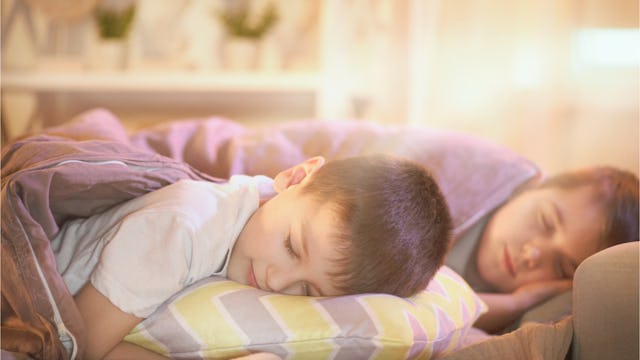Weighted Blankets May Help With Sleep Issues For Just About Everyone

Weighted blankets are all the rage these days, and many families are finding that their children are sleeping much sounder with that extra weight atop their bodies. As a person who suffers from anxiety and insomnia, I am strongly considering getting one for myself.
If you are unfamiliar with weighted blankets, let me fill you in. They are blankets that weigh much more than a traditional blanket, coming in around 15 to 25 pounds. They are often filled with the same crunchy soft beads as Beany Babies. You remember those cuddly, doe-eyed things from the 90s, right? Well, imagine sleeping with a large one draped over you.
Now some people might find this idea claustrophobic and heavy, but for others, the weight provides much needed comfort.
In the past, weighted blankets were usually marketed towards those with sensory disorders, depression, anxiety, and autism. But now, people are finding that they can work well for the fidgety children in your house who tend to get up in the night for no good reason and leer over your bedside like Michael Myers asking for a glass of water.
A few years back, when my middle daughter was in the NICU, the nurses would place a felt glove filled with beads across her chest. She always seemed to sleep a little sounder with that extra weight across her small body. I honestly hadn’t thought about that until now, but clearly this was the same idea as placing a weighted blanket across your child each night.
A weighted blanket feels a lot like someone hugging you to sleep. In fact, for the first couple years of my daughter’s life, the only way I could get the little wiggler to sleep was by snuggling next to her, my arm across her body. She’d hold my hand tightly, pulling my arm down on her body snuggly. Sneaking out of her bed each night once she was asleep usually took all my ninja skills.
Now don’t get me wrong, I really enjoyed those nightly snuggles. However, I can’t help but wonder if she might have gone to sleep easier, and stayed asleep longer, if I had placed a weighted blanket over her.
Keith Zivalich, creator of the Magic Blanket, told Forbes that the “extra pressure on the body is helpful for kids of all kinds, but particularly for kids with autism and sensory processing disorder.” He also claimed that the “added weight causes the brain to release neurotransmitters like serotonin and dopamine that improve moods and induce a calming effect.”
On the flip side — because there’s always a flip side — there are some risks associated with weighted blankets, particularly with young children. In 2008, a 9-year-old Canadian boy with autism suffocated while using a weighted blanket prompting a Quebec coroner to recommend stricter safety guidelines for the products, such as making sure children are not using a weighted blanket intended for adults and making sure that the child can apply and remove the blanket unassisted.
The Magic Blanket retails for as low as $60 and can run as high as $175. Other company can go as high as $300 for a weighted blanket.
Now, I don’t want to speak for other parents, but getting all three of my children to sleep through the night is about as likely as the stars aligning, and there are few things I crave more than sleep at this stage in life. There is also the difficult fact that when my children don’t sleep well, the rest of the day is little more than a fit-throwing booger fest. So if weighted blankets can make the nighttime struggle a little easier, then they might just be worth their weight in gold.
This article was originally published on